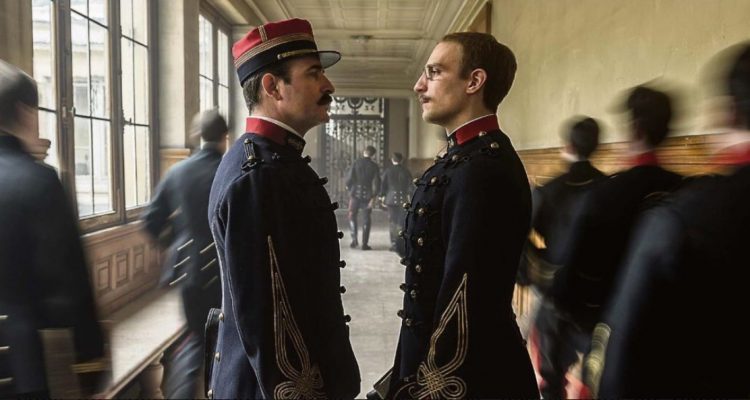Roman Polanski’s latest film, “An Officer and a Spy,” tells the real-life story of the infamous Dreyfus affair that rocked France in the 1890s. When espionage was discovered within the ranks of the French military, the higher-ups fingered the wrong man – who happened to be the only Jewish soldier in the bunch. Alfred Dreyfuss (played by Louis Garrel) was accused, arrested, and sentenced to life in a hellish penal colony thousands of miles from France, but in the years to come, a committed, righteous Colonel by the name of Picquart (Jean Dujardin) uncovers documents that categorically prove the spy is someone else entirely. But in an era of rampant antisemitism and deep-seated faith in the national fighting spirit, there was a refusal to acknowledge any wrongdoing on the part of the French government. Picquart, Dreyfuss, and his small group of outspoken defenders – most notoriously, writer Emile Zola – became persona non grata, detested and shunned wherever they went.
Shot in a deeply classical style with few overt visual flourishes, the first half of the film – which runs over two hours in length – takes quite some time to kick into action. It can even be a bit of a drag at points, with more paper-shuffling and desk shots than anyone could possibly deem necessary. In spite of the historical intrigue, “An Officer and a Spy” moves at a purposefully stately pace, and only really picks up speed in the final act, when further imprisonment, threats of violence, and an honest-to-goodness duel drum up a compelling momentum. There’s a quiet beauty in the blocking of courtroom scenes and particularly in one super-imposition of Dreyfuss’ island prison with a montage of newspaper headlines about him, which looks ripped straight from a John Huston thriller. Polanski has always had a remarkable eye, and it remains intact here – if restrained.
It’s evident that there are echoes in the film about persecuted, hunted men, wrongly hounded by society and the press, and one can only hope Polanski isn’t inferring that there’s common ground between himself and his beleaguered characters. Polanski’s a smart filmmaker; here, he’s cloaked his perspective in a factually-driven period piece, working through the specifics of the past and neatly avoiding drawing any overt comparisons or solid links between his controversial past and the work. That’s probably wise; it’s frankly mind-boggling that a convicted rapist, such as Polanski, could possibly feel so self-righteous about this.
So long as festivals like Venice choose to screen Polanski’s movies, critics will be obliged to watch them and write about them; it’s an egregious choice on their part, and I’d rather they never had programmed it at all. But asked to evaluate “An Officer and A Spy’s” relative merits, there is nothing to hate about the film on its own terms. It’s a middling historical drama, finely crafted and ever so slightly stodgy in spite of a compelling last act. For the festivalgoer, it’s an understandable impulse to either avoid seeing the film altogether or hope for it to be suitably terrible; simply bad art to match a simply bad human being. But easy answers aren’t forthcoming when it comes to Polanski’s work, and this is not bad art. Be that as it may, there’s also nothing within “An Officer and a Spy” that could possibly suggest the furor around it. In the end, that furor might be its most memorable trait. [C]

